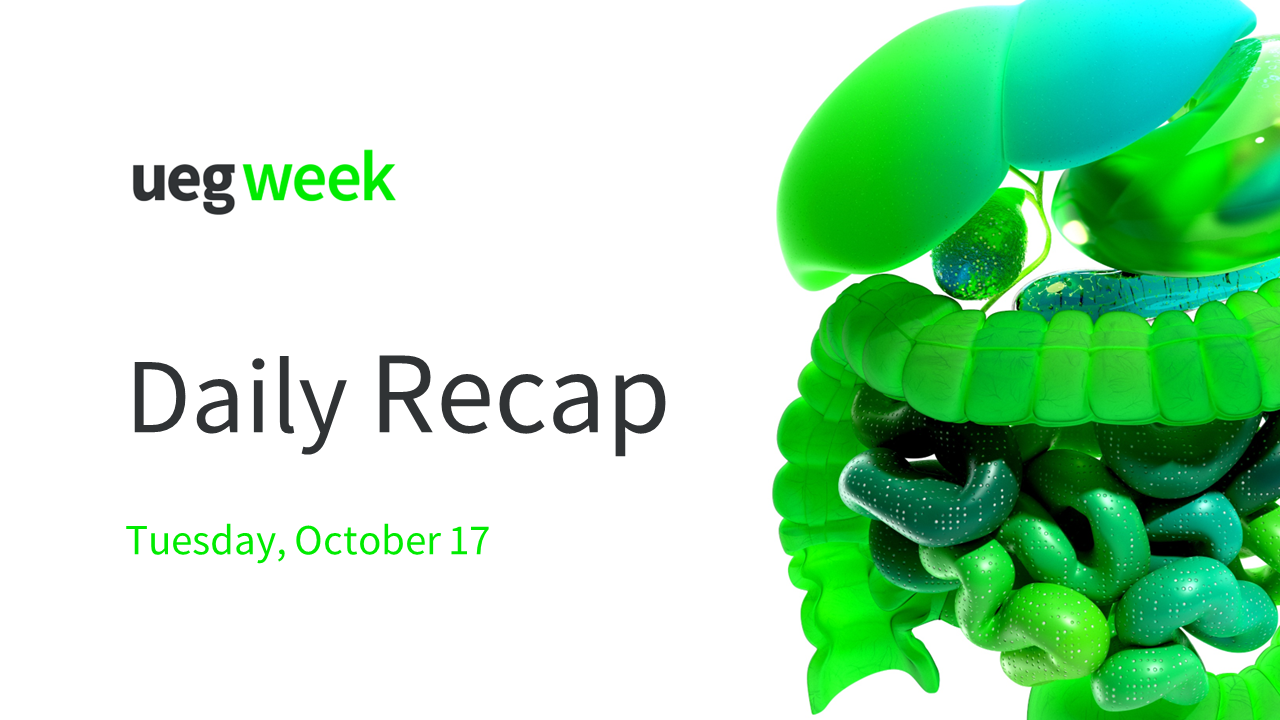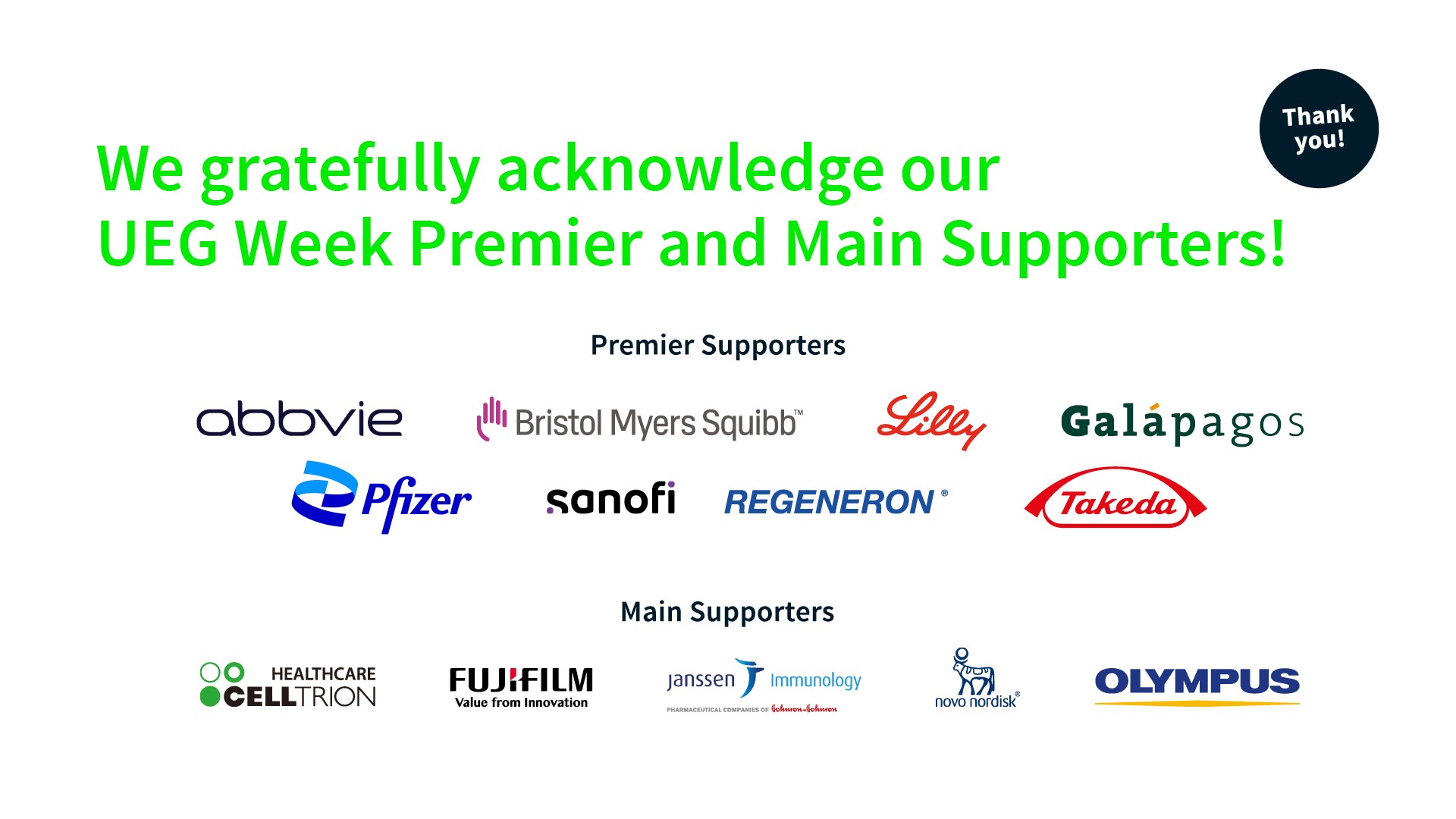
Thank you for being part of an unforgettable UEG Week 2023!
Today marked the fourth and final day of the congress, featuring even more exciting abstract-based sessions and insightful clinical case discussions.
Continue reading to relive some of the standout science from the closing day.

Scientific highlight: Amitriptyline helps relieve IBS symptoms
Amitriptyline, a cheap and widely available prescription drug, can improve symptoms of irritable bowel syndrome in patients seen in GP surgeries, new research has found.
Led by researchers at the Universities of Leeds, Southampton, and Bristol and funded by the National Institute for Health and Care Research (NIHR), the ATLANTIS trial was conducted in primary care. Some 463 people with IBS took part from three regions across the UK - West Yorkshire, Wessex, and West of England. They were recruited from 55 general practices.
Participants were put at random into two groups – those receiving amitriptyline and those receiving a placebo. Participants controlled how many tablets of the trial medication they took, receiving support via the patient dose adjustment document that was developed with patient representatives especially for this trial. This enabled participants to increase or decrease the number of tablets based on their IBS symptoms and any side effects experienced.
Participants taking amitriptyline reported a bigger improvement in their symptom scores after six months compared with those taking a placebo. Those taking amitriptyline were almost twice as likely as those taking a placebo to report an overall improvement in IBS symptoms, with amitriptyline performing better across a wide range of IBS symptom measures.
Researchers monitored participants’ anxiety or depression scores and found that they were not altered – suggesting that the beneficial effects of the medication were via the gut, not because of any effect as an antidepressant.
No safety concerns were identified and side effects in people on amitriptyline were mostly mild, such as a dry mouth in the morning.
Now the trial team is recommending that GPs support their patients with IBS to use amitriptyline to manage their symptoms – and has made the dose adjustment document available for clinicians and patients.
Alexander Ford, Co-Chief Investigator and Professor of Gastroenterology in the University of Leeds’s School of Medicine said, “Amitriptyline is an effective treatment for IBS and is safe and well tolerated. This new rigorously conducted research indicates that general practitioners should support patients in primary care to try low-dose amitriptyline if their IBS symptoms haven’t improved with recommended first-line treatments.”

Scientific highlight: Computer aided detection outperforms general endoscopists at identifying early neoplasia in Barrett’s oesophagus
A two-phase benchmarking study reveals that computer aided detection (CADe) systems could address the challenge of neoplasia detection in Barrett’s oesophagus (BO).
The rapid detection of neoplasia can contribute to better outcomes and reduced mortality in patients with BO, but early neoplasia is often too subtle for general endoscopist detection. To address this unmet need, investigators developed a CADe system, pre-trained using both generic and domain-specific visual databases and further trained on a large, heterogeneous BO dataset from 15 international endoscopy centres (6337 neoplastic and 7695 non-dysplastic images).
The CADe system was validated using two independent, prospectively collected video test sets: ‘All-comers’ was representative of cases encountered in daily practice (n=45 patients with neoplasia and n=66 with no dysplasia), while ‘benchmarking’ was artificially enriched with subtle neoplasia, representing the challenging cases in clinical practice (n=47 neoplasia and n=82 no dysplasia). The benchmarking set was evaluated by 63 general endoscopists in two phases: Phase 1 was without CADe assistance and Phase 2 was after a 6-week washout period, when the same test set was evaluated with CADe assistance. Internationally renowned experts (n=14) also evaluated the benchmarking test set.
For the more challenging benchmarking test set, CADe demonstrated 91% sensitivity for detecting neoplasia, compared with 97% for the all-comers. Impressively, general endoscopist sensitivity to neoplasia increased by 12%, from 67% to 79%, with CADe assistance. For the benchmarking set, CADe demonstrated 85% specificity to detecting non-dysplasia, compared with 82% in the all-comers. General endoscopist specificity decreased by 2%, from 96% to 94%, with CADe assistance.
But how did CADe compare with expert endoscopists? With a median sensitivity of 86% and specificity of 90%, non-inferiority of CADe compared with experts was concluded.
These findings demonstrate that CADe systems alone or as assistance for general endoscopists are significantly superior at detecting neoplasia in BO when compared with general endoscopists alone (P<0.001), with CADe detecting virtually all BO neoplasia encountered in daily practice.

Scientific highlight: Long-term upadacitinib maintenance therapy is effective and safe for patients with moderately to severely active ulcerative colitis
U-ACHIEVE is a Phase 3 multicentre, double-blind, randomised control programme designed to address the unmet need for robust and effective advanced therapies for UC.
It comprises two replicate induction studies and one maintenance study, with previous findings demonstrating the efficacy of the Janus kinase inhibitor, Rinvoq® (upadacitinib), after 52 weeks maintenance therapy. The findings presented at UEG Week 2023 were from approximately 2 years of data combined from the 52-week maintenance study and 48 weeks of an ongoing, 288-week open-label extension study.
Patients with moderate to severe UC received upadacitinib 15 mg or 30 mg once daily, with efficacy and safety endpoints being assessed at Week 48 of the extension study. Patients achieving clinical remission per Adapted or Partial Mayo scores, clinical response per Adapted Mayo score, endoscopic improvement and endoscopic remission were similar for patients taking upadacitinib 15 mg (n=101) and 30 mg (n=137).
However, maintenance of endoscopic remission, defined as remission at Weeks 0 and 48 of the extension study, was achieved by a greater proportion of those taking 30 mg (81.1% of patients; 95% confidence interval [CI]: 70.6–91.7) compared with 15 mg (71.8% of patients; 95% CI: 57.7–85.9).
In terms of safety, no treatment-emergent adverse events (TEAE) leading to death occurred. TEAE and exposure-adjusted event rates (EAER) were significantly lower with upadacitinib 15 mg vs 30 mg, including serious infections (1.6 vs 4.6 events/100 patient-years, respectively), herpes zoster (3.8 vs 5.8), neutropenia (1.6 vs 4.2) and creatine phosphokinase elevation (2.7 vs 6.2).
Conversely, the EAER for hepatic disorder was higher with 15 mg vs 30 mg (8.6 vs 4.2). Neither dose resulted in adjudicated major cardiovascular adverse events. While no adjudicated venous thromboembolic events occurred with 15 mg, one event did occur with the higher dose. Additionally, one event of malignancy, excluding non-melanoma skin cancer, occurred with each of the two doses. In ongoing efforts to provide robust treatment opportunities for patients with moderately to severely active UC, long-term upadacitinib appears to achieve clinical and endoscopic endpoints in a maintenance therapy capacity without uncovering any new safety signals.

Thank you to our industry sponsors
We would like to thank all dedicated industry sponsors for their invaluable support during UEG Week 2023.
The presence of the world’s top pharmaceutical and medical device companies at our onsite industry exhibition provided attendees with access to the latest advancements in therapies, innovations and insightful product updates for 2023.
Moreover, our industry symposia, industry supported abstracts, and expert sessions held at industry booths created the ideal platform to present cutting-edge research, new data and therapeutic breakthroughs. For those who couldn’t make it to Copenhagen, our virtual attendees had the opportunity to explore all exhibitors onsite from the Industry Lobby on the virtual platform where they could access information on industry symposia and locate onsite exhibitors.
Watch all Industry Symposia sessions in the Missed a Session library
We want to express our sincere appreciation to our sponsors who are fundamental to the success of UEG Week.

See you in Vienna next year!
We’re already gearing up for UEG Week 2024, and we can’t wait to see you there.
Mark your calendars to join us at the Messe Wien Congress Centre in Vienna, Austria from October 12 – 15 for another exhilarating four days filled with unapparelled learning, networking opportunities and scientific exchange at the best gastroenterology congress in the world!




Please log in with your myUEG account to post comments.